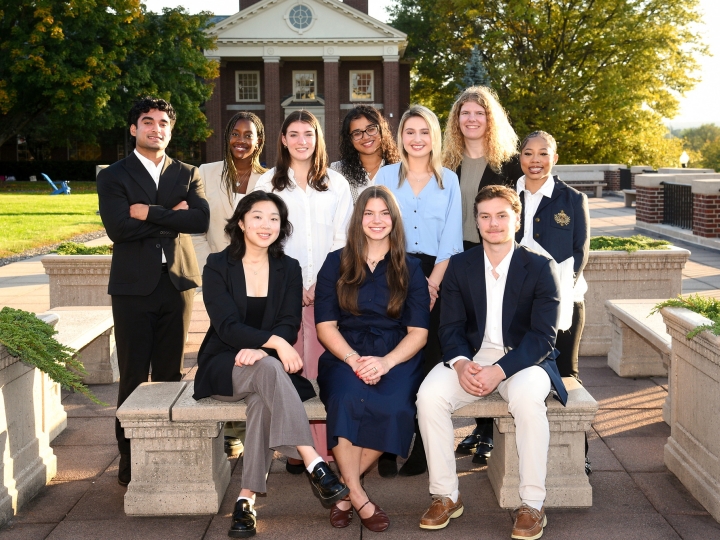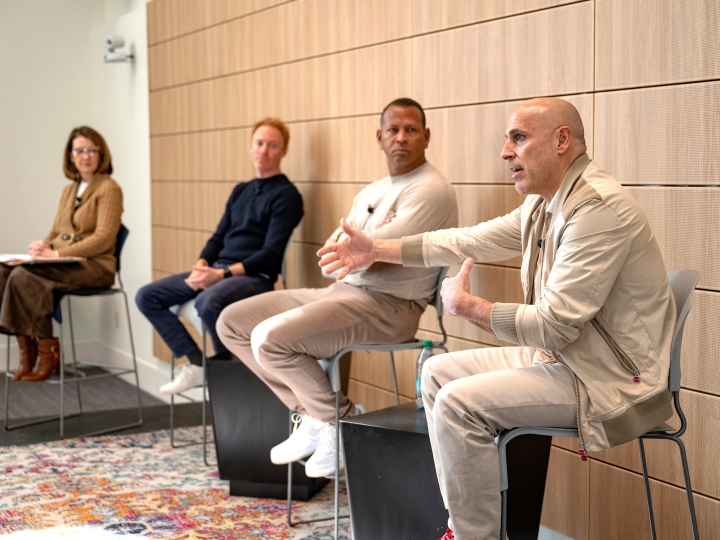
Bucknell Fulbright Award Winners Take Their Passions for Community-building Global
June 15, 2022
Giuliana Ferrara '22, Genevieve Block '22 and Lily Shorney '22 are Bucknell's 2022 student Fulbright Award winners. Photos by Emily Paine, Communications
The drive to create lasting change for good runs as a common thread for many Bucknellians. This year, three Fulbright Award winners are taking that passion abroad on their next steps to support and transform communities.
Offering study, research, teaching and exchange opportunities in more than 140 countries, the Fulbright U.S. Student Program expands perspectives through professional and academic development and cross-cultural dialogue. The program is grounded in community engagement and cultural immersion, allowing Fulbrighters to expand their viewpoints as they develop mutual understanding with the people of their host country.
Bucknell's 2022 award winners exemplify these values. And while they each face their Fulbright experience with individual inspiration and diverse backgrounds, they share the common goal of working to build stronger communities.
Genevieve Block '22; Colombia

Genevieve Block '22 hopes to learn about successful health care system and policy reform in Colombia. Photo by Emily Paine, Communications
When her original internship experience was canceled due to COVID-19, Genevieve Block '22 made a quick pivot and secured a summer experience working with an environmental group called Clean Water Action in her hometown of Baltimore. The focus of her work settled on the impacts of the virus on undocumented immigrants working in the Maryland farming industry.
"They were being unfairly treated in their working environment and were being heavily exposed to COVID," says Block. "I worked on creating legislation and submitting it to the Maryland government to help support them. Through that internship, I became really passionate about immigration and supporting people through public health policies."
It was this experience that inspired Block to apply into the Fulbright program. She is heading to Colombia later this summer — specifically the city of Bucaramanga in the Santander region — to serve as an English teaching assistant. There, she'll work alongside a professor in a university classroom, assisting with activities and leading sections of lessons for English language learners. "And then in addition to that, you're expected to engage in a community project," she says.
Block fully intends to take advantage of the opportunity.
"When I was looking for countries to apply for the Fulbright, Columbia really stood out to me because they have a very strong health program," she says. "Over the past 10 years, they've totally changed the system to provide better care to people in Colombia, including Indigenous populations."
Block knew early in her college career that she was interested in international work and had aspirations of joining the Peace Corps before entering law school.
What she didn't know early on was that her academics would center on the study of geography. "During the first semester of my first year, I enrolled in Geography 100 and ended up loving it. My professor saw how passionate I was and she convinced an upper level geography professor to let me into another class," Block says. That class was Third World Development geography and had a focus on health care. "I was a freshman in a class of seniors, and I loved it. It totally changed my course at Bucknell and made me really interested in things like health development and international development."
Settling in as a geography and Spanish double major, she focused on human geography in Latin America and the Global South. As she grew in her understanding of the region, she became particularly interested in policies and how they change.
Block's path is clear ahead of her. "I want to go to law school and focus on either health or immigration law," Block says. "In both of those fields, having a fluency in Spanish is critical."
Her Fulbright year in Colombia is the perfect next step. "There is no better place I can think of to learn about changes in policy specifically made to improve a health care system and support the population. Hopefully I'll have the opportunity to volunteer in a health organization to see those changes first hand."
Lily Shorney '22; Czech Republic

Lily Shorney '22 hopes to gain a deeper understanding of how music supports the mental health of children and adolescents. Photo by Emily Paine, Communications
A high school performance of The Bartered Bride, a famous Czech operetta, coupled with the desire to explore how music therapy can affect health outcomes laid the foundation for Lily Shorney '22's Fulbright application to the Czech Republic. "I've never been to that part of the world, but I have done a lot of research on Prague. So many things about the city — the architecture and the culture — are so intriguing. And my singing of that Czech opera is what sparked my interest."
She's headed to Chrudim, a small town about an hour outside of Prague, where she, too, will serve as an English teaching assistant.
"At Bucknell, I worked for the Lewisburg Listening Post, a mentor program for middle and elementary school students," says Shorney, a psychology and women's & gender studies double-major from Glen Ellyn, Ill. "It was an amazing experience and helped me realize how much I love doing that type of work."
Shorney's Fulbright experience will be in "a gymnázium, which is similar to a high school. It's like secondary education," she explains. "There's a four-year track and an eight-year track, so the students that I will be working with range from 11 years old to 18 or 19."
As she considers her upcoming year abroad, she sees music woven in. Notably, Shorney sees the benefit of music's ability to bridge cultural gaps. "Music can really transcend language barriers. And those barriers might be hard to cross in the Czech Republic," she says.
Ultimately, she is driven by her desire to combine her love of music with her passion for supporting others. "I know for sure that I want to work to improve the health of communities — it's definitely a huge goal and aspiration of mine. As far as the Czech Republic goes, I'm definitely drawn there by music."
Giuliana Ferrara '22; Belgium

Giuliana Ferrara '22 is exploring all options when it comes to building community when she arrives in Belgium. Among them is a book club. "I've always liked to read, so perhaps starting a book club with my students could be a way to connect with them," she says. Photo by Emily Paine, Communications.
Giuliana Ferrara '22, an international relations and Italian studies double-major, grew up in Parsippany, N.J., with a global perspective. "My dad is actually an immigrant from Italy," she says. "So, growing up, I always had one foot in American culture and one foot in Italian culture. I was in this environment where global understanding and communication has always been valued in my family."
"When I heard about this Fulbright opportunity, it sounded right up my alley," she says. "It came down to two things: Having this background in cultural awareness and appreciation and specifically having studied European refugee policies."
Her desire for deeper global literacy has led Ferrara to Ghent in Belgium, where, like Shorney and Block, Ferrara will work as an English Teaching Assistant, teaching at Ghent University while she leans into the experience.
She's preparing readily, having already subscribed to local newspapers to bolster her knowledge of the way the country is handling refugee support. "As the home of the EU, NATO and other intergovernmental organizations, Belgium is the hub of a lot of international relations. But Belgium is also known for its refugee integration policies," she says. "Almost every day, I get an article about the new refugees in Belgium."
It's a topic into which Ferrara has plenty of insight. Her research at Bucknell focused on Europe, Eurasia and Russia, and she completed her honours thesis on refugee integration strategies in the EU. Citing the current conflict in Ukraine as well as continued disruption in the Middle East, Ferrara has a unique opportunity to observe an established system. "I know that Belgium is a highly rated country in this area as well, and I wanted to see firsthand how that plays out," she says.
Her experience has the ability to inform her future career. "I hope to go on to law school and get a job drafting policies and laws aimed at improving U.S. immigration and refugee policies," she says. "Having the opportunity to witness firsthand how some countries manage this area will be a fascinating experience."
She's also looking forward to the cultural bath: learning Flemish, cheering on the Belgian national team in the World Cup, sampling chocolates and waffles, and possibly starting a book club with students from the university. "I'm really looking forward to just exploring the culture and seeing what opportunities lie ahead," she says. "That's something I learned from Bucknell that I'll always carry with me — to remember to be open to new experiences and opportunities."
Fulbright Scholars
In addition to three student award winners, two Fulbright scholars have also been named for the 2022 award cycle.
With the same focus on community and mutual understanding, the Fulbright U.S. Scholars program enables teaching, research and professional development opportunities across the globe. Professor Emily Martin, music; and Diane Jakacki, digital scholarship coordinator and affiliate faculty in comparative & digital humanities; each earned the distinction of Fulbright Scholars for the 2022 award cycle. They're both looking forward to the focused time the Fulbright award enables for their professional passions.
Martin will head to the Netherlands, where she will teach American and Canadian art song to voice students at the Royal Conservatory of The Hague, focusing mostly on underrepresented composers like Florence Price, Robert Stillman and Cecilia Livingston. "They have a very specific program called The New Audiences and Innovative Practices Program," she says. Developed at the Royal Conservatory, the program is only housed in three other conservatories in the world. Notably, her roster of students will include Ukrainian refugees. "They have a huge influx of refugees coming into the conservatory who studied voice in Ukraine," she says.
In addition to teaching and study, Martin plans to perform during her year abroad. While she has plenty to look forward to, she notes her excitement about the simple shift in mindset. "The thing I'm looking more forward to, more than anything, is just re-energizing my creativity and coming up with new ideas to bring back."
Jakacki will spend six months focusing on the classification of historical events as data points. Her goal is to contribute to the critical infrastructure that is growing the digital humanities discipline, enabling access across research findings as scholars search for an understanding of how specific societies, practices or other events came to be. She sees the identification of connected events as improvements to the way researchers build the worlds around which their work revolves. "This Fulbright will allow me to tackle the really hard questions a lot of us have been addressing when we're thinking about digital humanities and linked data — the idea of what determines an event from both a broad and granular perspective," she says. "My work will bring value to other scholars by creating parameters that help define and record these events."
"It's one of the most exciting things about the Fulbright," she says. "The work I'm doing can be applied and extrapolated, and other researchers can use these concepts that I am thinking about."

